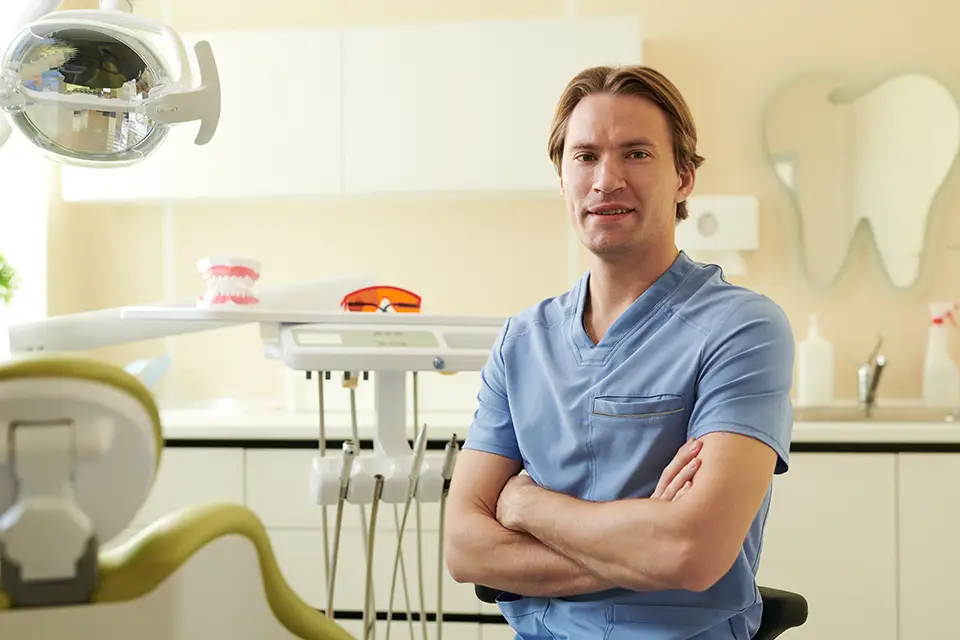Step outside on a frosty morning, take a breath, and suddenly your teeth sting. Or maybe it’s an iced coffee that does it. Patients ask us this all the time at Sunshine Dentistry in Richmond Hill, Ontario: why do your teeth hurt when it’s cold?
It can feel jarring, especially when it happens out of nowhere. For some, the discomfort is a quick twinge. For others, it lingers and makes daily life difficult. The reality is that tooth sensitivity to cold is common, but it’s not always harmless. Sometimes it points to enamel wear or gum recession. Sometimes it’s an early warning sign of deeper disease.
So let’s walk through the science, the common causes, and the solutions. By the end, you’ll not only know “why do your teeth hurt when it’s cold?”, but also what can be done about it.
Why Do Your Teeth Hurt When It's Cold? The Science Explained
Teeth aren’t solid blocks. They’re layered. The enamel is the hard outer shield. Beneath it lies dentin, which contains countless microscopic tubules leading to the pulp. The pulp houses nerves and blood vessels.
When enamel thins — or when gums recede and expose root surfaces — cold stimuli slip through those tubules. The nerve inside the pulp registers the signal as pain. That’s why temperature changes feel so sharp.
In clinical terms, this is dentin hypersensitivity. In everyday terms, it’s the answer to “why do your teeth hurt when it’s cold?”
Common Causes of Cold Tooth Sensitivity
Most cases don’t come from just one factor. Here are the most frequent culprits:
- Enamel erosion – Acidic foods and drinks, teeth grinding, or overbrushing can wear enamel down over time.
- Gum recession – Roots lack enamel. When gums pull back, those roots react strongly to cold.
- Cavities – Decay creates a direct pathway for cold to reach inner layers.
- Cracks or fractures – Even small cracks act as channels for temperature change.
- Old or failing fillings – Restorations that don’t seal properly leave dentin exposed.
Different cause, same outcome: cold gets closer to the nerve than it should.

When Cold Tooth Pain Signals a Bigger Problem
A quick zap that disappears? Often harmless. Lingering pain after the cold stimulus is gone? That’s something else.
In dentistry, prolonged pain can point to:
- Deep decay approaching the pulp.
- Gum disease exposing root surfaces.
- Inflamed pulp tissue inside the tooth.
This is why the question “why do your teeth hurt when it’s cold?” matters. It’s not always about minor sensitivity. Sometimes it’s a sign of infection or structural damage.
At-Home Remedies for Cold Tooth Sensitivity
For milder cases, conservative strategies often help:
- Use a desensitizing toothpaste with potassium nitrate.
- Switch to a soft-bristled toothbrush and lighter brushing pressure.
- Add fluoride rinses to reinforce enamel.
- Limit acidic foods and carbonated drinks.
- Wear a nightguard if you grind at night.
These don’t fix underlying disease, but they reduce the nerve’s overreaction and give you relief in daily life.
Professional Solutions at Sunshine Dentistry
When sensitivity persists, professional care is necessary. At Sunshine Dentistry in Richmond Hill, Ontario, treatment depends on the cause:
- Bonding or sealants cover exposed root surfaces.
- Replacing old restorations restores a proper seal.
- Periodontal therapy addresses gum disease and recession.
- Endodontic therapy (root canal treatment) resolves severe nerve inflammation.
The approach is always tailored. One patient may need only fluoride applications. Another may need root canal therapy to preserve the tooth. The key is proper diagnosis before treatment.

Preventing Cold Sensitivity in Your Teeth
Prevention is the most reliable solution when asking “why your teeth hurt when it’s cold?” . Clinically, this means:
- Brushing twice daily with fluoride toothpaste.
- Flossing daily to keep gums healthy.
- Scheduling regular dental checkups and cleanings.
- Avoiding constant exposure to acidic beverages.
- Wearing protective guards if you clench or grind.
These habits not only reduce cold sensitivity but also protect long-term oral health.
Conclusion: Why Do Your Teeth Hurt When It's Cold and How to Stop It
That sting from a winter breeze or iced drink is your teeth sending a message. It may be a minor sensitivity. Or it may be a signal of something deeper. Asking “why do your teeth hurt when it’s cold?” is the first step. Getting a proper diagnosis is the next.
At Sunshine Dentistry in Richmond Hill, Ontario, we identify the cause, provide effective treatment, and give patients lasting relief. Cold should be refreshing — not painful.
If cold weather or cold drinks are making your teeth sting, don’t ignore it. Call Sunshine Dentistry in Richmond Hill, Ontario, today.
We’ll find out “why your teeth hurt when it’s cold”, and we’ll help you enjoy life — and the weather — without the sting.
FAQs: Why Do Your Teeth Hurt When It's Cold?
Is tooth sensitivity to cold normal?
Yes, occasional sensitivity is common. But persistent or worsening pain should always be checked.
Does this always mean I have cavities?
Not necessarily. Cavities are one cause, but gum recession, enamel erosion, and cracks are equally common reasons.
Can toothpaste for sensitivity really help?
Yes. With consistent use, many patients notice improvement within weeks. It doesn’t cure disease, but it reduces nerve response.
When should I book an appointment?
If the pain lasts longer than a few seconds after the cold is gone, or if swelling appears, call for an exam.



